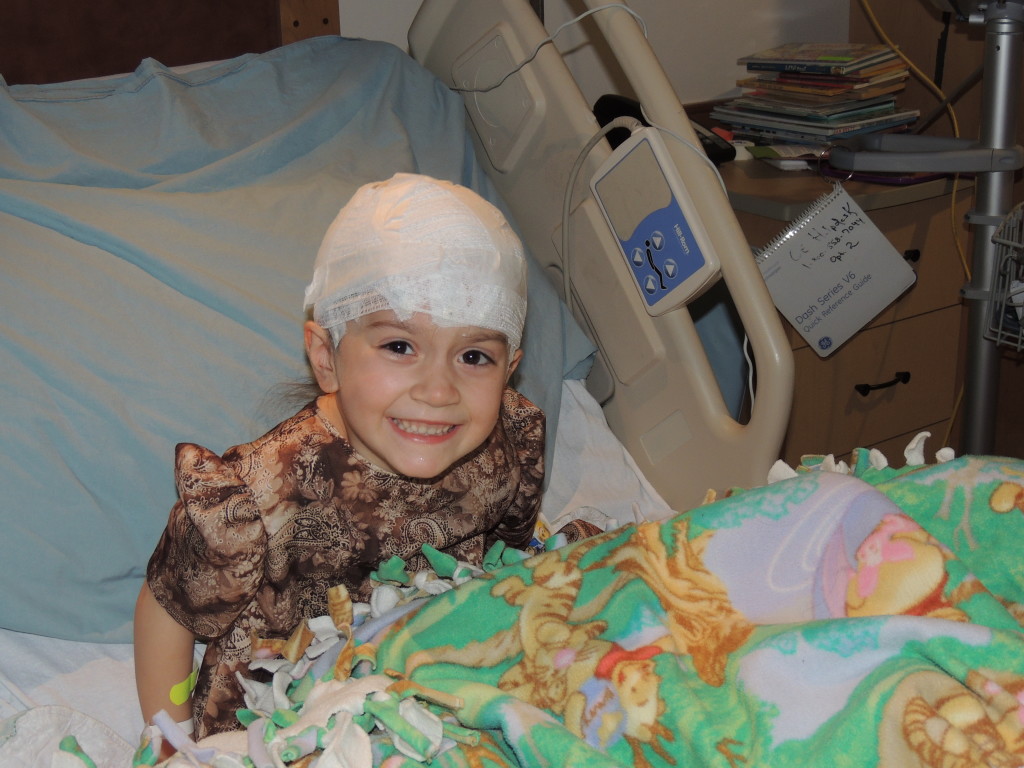The following post was written by Stephanie J. Leinbach, a blogger friend and mother of an epileptic child:
***
We were at Children’s Hospital less than ten hours when our story was put into perspective.
I ran down to the cafeteria while Linford stayed with Tarica. As I stepped out of the elevator and turned toward the cafeteria, someone spoke behind me.
“I love your dress. Fall colors are my favorite.”
I turned to find an older woman following me. “Thank you,” I said.
“You made it yourself, of course,” she said. It was not a question, and she went on. “I used to sew, too, a long time ago.”
We walked together through double doors and turned right into a wider corridor, me falling into my customary awkwardness with a stranger. Think, Stephanie. Think of something to say.
But there was no need. She was chatty enough to cover my missing equilibrium.
She told me about her granddaughter here at Children’s. Her granddaughter had a rare type of blood cancer, so rare she was rather a specimen around here, her grandmother said with an odd mix of sadness and pride.
I said I was very sorry to hear that. It must be so hard.
But, she said brightly, the doctors say if she must have cancer, this is the one of the best to have, if that can be said about cancer. Her chance of full recovery is quite high. We are hoping she can go home the end of March.
By this time, we had stopped just outside the cafeteria while the stream flowed around our island of conversation.
“How long has your granddaughter been here?”
“Since August,” she said.
August. It was now February. That was…that was…too many months to count while she was talking.
“Why are you here at Children’s?” she asked.
Not for much, I wanted to say. Nothing very much at all. “My daughter has epilepsy, and medication isn’t controlling her seizures. She is here for ten days of testing to see if she qualifies for brain surgery.”
Ten days. What are these among so many? (And little did I know our ten would shrink to six.)
We parted with promises to pray for each other and for the children we love—and I have prayed. I pray still. I will not soon forget that woman’s granddaughter.
I distractedly purchased food and returned to the elevators. The woman sharing the elevator with me was also going to the sixth floor. We briefly spoke, she of her daughter who was born ten weeks early in October and has been hospitalized ever since.
First August and now October.
I crawled back to the Epilepsy Monitoring Unit and crept into Room EP4, where a bright-eyed little lady in a gauze turban smiled at me.
She wasn’t sick. She wasn’t hurting. She wasn’t dying. She was healthy—save for a little matter of haywire electricity in her brain.
I was so ridiculously blessed it was embarrassing. Why did I think I had a story? How could I dare to tell it? So many stories are more significant, more traumatic than ours.
And what if—it was a new thought, or perhaps an old thought with a new slant—what if someone feels her own story is minimized by the telling of my story, as I felt when I compared ten days to six months? True, many families are worse off than we are, but still more families have never needed a children’s hospital. Would my story make someone feel like her story was insignificant?
We shrink from insignificance. We can bear pain and fear and suffering, but if we are made to feel we do not matter, we crumble inside even as we defiantly shore up our walls.
(At least I do. Maybe I’m alone in this.)
On one hand, I found people whose stories surpassed ours in length and breadth and height. On the other, I found those with stories containing less drama and fewer doctors.
Was our story significant enough to be told?
Down in the cafeteria again a few days later, I looked around the crowded space and wondered what these people would say if I asked them for their stories. Hospital staff with badges, parents wearing pink labels, cafeteria workers in uniform—every one of them had a story.
And…and…(I finally realized)…every story mattered, even mine.
Everyone is made in the image of God. Everyone laughs and cries and makes mistakes. Everyone feels fear and anger and disillusionment and wonder and grief.
Every one of these stories is written in the books of God.
They matter. I matter. You matter.
The story I tell is only one out of billions, and significance is never measured in human words.
Why then do I tell it?
I tell our story because I am a writer and I can’t seem to help myself.
But more than that, I tell this story because perhaps it can stand in proxy for all those untold stories. Because there are many mothers who stand by hospital beds living stories that would break your heart. Maybe I can be a tiny voice for them, or a small reminder of those you know with stories a little like mine. Or maybe your story is similar, and the words you find here spark a connection.
Beyond that, there is this: Our stories are unique and special, never the same, but the emotions behind the stories are common to us all. My fear is an echo of your fear, my joy of your joy. You do not have to live a story anything like mine to know what it’s like to hurt and worry and laugh and praise God. You have all that in your story already, and our common emotions create a connection beyond the story itself.
More than anything, however, I tell our story because God is in it, undeserving though we are, and I will not, cannot be silent.
God makes every story significant. Even if it ends in the womb. Even if happens in a quiet, unnoticed corner of the world. Even if you can find no words for your pain. Even if it seems God cannot possibly be in this chapter. Even if nothing more exciting than a flat tire happens in it.
Our stories matter because we matter, and most of all to God.
Never, never doubt that.
***
 Stephanie J. Leinbach lives in the mountains of central Pennsylvania with her husband and three children, and she writes at her dining room table with her laptop and a lot of passion for story. Once upon a time, she wrote a book called Light My Candle: Prayers in the Darkness of Miscarriage to share the story of her journey with miscarriage. But for the last year, her family has been defined by a different story ever since her four-year-old daughter started seizing and was subsequently diagnosed with epilepsy. In February 2015, her daughter went for testing to see if she qualifies for brain surgery, but the decision to go ahead has not yet been made. She is sharing that story as it unfolds over at www.stephaniejleinbach.com, where she writes of faith and family and finding God.
Stephanie J. Leinbach lives in the mountains of central Pennsylvania with her husband and three children, and she writes at her dining room table with her laptop and a lot of passion for story. Once upon a time, she wrote a book called Light My Candle: Prayers in the Darkness of Miscarriage to share the story of her journey with miscarriage. But for the last year, her family has been defined by a different story ever since her four-year-old daughter started seizing and was subsequently diagnosed with epilepsy. In February 2015, her daughter went for testing to see if she qualifies for brain surgery, but the decision to go ahead has not yet been made. She is sharing that story as it unfolds over at www.stephaniejleinbach.com, where she writes of faith and family and finding God.
Luci, I love your view on life. This last guest speaker touched my soul. Encouragement through words is a gift of God. Blessings, Shilah
This is beautiful and I already checked out Stephanie’s blog because I like her writing so much! This: We shrink from insignificance. We can bear pain and fear and suffering, but if we are made to feel we do not matter, we crumble inside even as we defiantly shore up our walls.
No, Stephanie, you are not alone. This whole post resonated deeply with me. I pray in this moment that you will have strength to live your story.
Pingback: I ramble along | three green doors